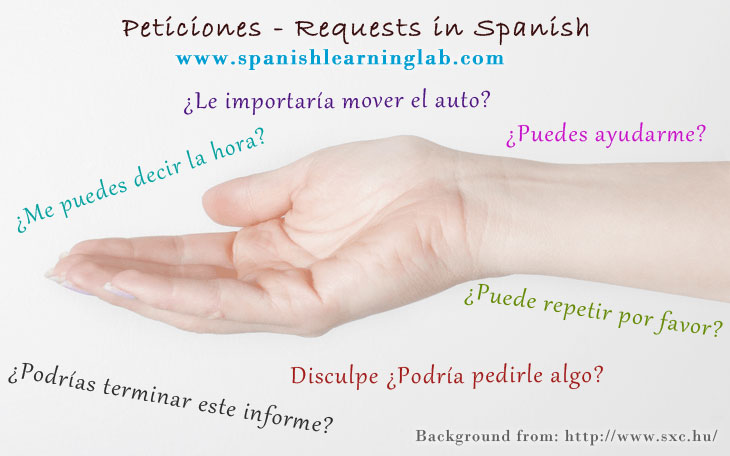Knowing how to make requests in Spanish could be very useful in class and in real life whenever you need help or something else. We use the term “Las peticiones” to refer to requests in Spanish. Most of the time, they are formed using a very important stem-changing verb, PODER. In this lesson, you will learn several expressions and common ways to ask for favors in Spanish and other purposes. We will learn ways to adapt questions to sound more polite or formal in the language. Let’s start…

Using the verb PODER to ask for something in Spanish.
Requests in Spanish are often constructed using the verb PODER in its different conjugations. PODER corresponds to both the modal CAN and the verb “TO BE ABLE TO” in English. As we mentioned before, PODER is a stem changing verb so its stem will change its stem from “Pod-” to “Pued-” for all the pronouns, except for “Vos, Vosotros” and “Nosotros”, for example: “Yo puedo…”, “Tú puedes…”, “Nosotros podemos…” and so on.
Basic requests in Spanish need question marks at the beginning and end, and would look like this: ¿(Tú) puedes ayudarme? (Can you help me?). Remember the subject pronoun is optional and actually your question may sound more natural if you leave it out. Also, if you ask for something using USTED, then you will sound more polite and formal, e.g. ¿Usted puede ayudarme? (formal) vs ¿Podés ayudarme? (informal). Here are some examples using the verb PODER for asking for favors in Spanish and other requests:
|
¿(Tú) puedes abrir la puerta? (informal)
May you open the door?
|
|
¿(Usted) puede abrirme la puerta por favor?
May you open the door for me please?
|
|
Disculpa ¿Puedes explicar eso de nuevo?
Excuse me, May you explain that again?
|
Asking for favors in Spanish using PODRÍA
It would definitely be more polite, at least in Latin America to ask for favors in Spanish using the conditional form of PODER, i.e. PODRÍA. This form of the verb is often used for probabilities, but it can also be used for other purposes, for example: ¿(Tú) Podrías ayudarme?.
|
¿(Tú) Podrías ayudarme a terminar mi plan?
Could you help me finish my plan?
|
|
¿Podrías ser un poco más cortés?
Could you be a little more polite?
|
|
¿(Usted) Podría ir a la tienda a comprar esto?
Could you go to the store to buy this?
|
Making polite requests in Spanish
PODER and PODRÍA are not the only ways to make requests or ask for favors in Spanish. Sometimes, it will be more appropriate to use the equivalent phrases for “Would you mind…” , that is “¿Te importaría + action?”, “¿Te molestaría + action?”, “¿Quisieras + action?” and “¿Te gustaría + action?”. Know that each way to ask may be appropriate in a context or country, but not in others.
The indirect object pronoun TE could be easily replaced by LE(formal, singular) or LES(formal, plural). QUISIERAS and GUSTARÍA are more like commands than requests so they may sound a little too demanding, but again this may be the way people are used to make requests in some Spanish-speaking countries. Here are some examples using the ways to make requests in Spanish we just mentioned:
|
¿Le importaría mover su auto? (formal)
Would you mind moving your car?
|
|
¿Te importaría apagar el televisor? (informal)
Would you mind turning off the TV?
|
|
¿Les importaría describir al chico de nuevo? (request for several people)
Would you mind describing the guy again?
|
|
¿Te gustaría darme algo de dinero? (this may sound too demanding)
Would you like to give me some money?
|
|
¿Quieres salir por favor? (maybe for a quarrel )
Do you want to leave please?
|
Our final advice for this kind of question is that you always try to use the right expressions depending on the formality of the conversation. Mind the tone you use when asking for favors in Spanish so you do not sound rude, even when your question may sound great to you. Be as polite as possible and do some research about the most appropriate way to make requests in Spanish in the country you are visiting. The examples presented in this lesson may be a good starting point, but it is always up to you to find the opportunities to learn even more in a real situation. ¡Buena suerte!
